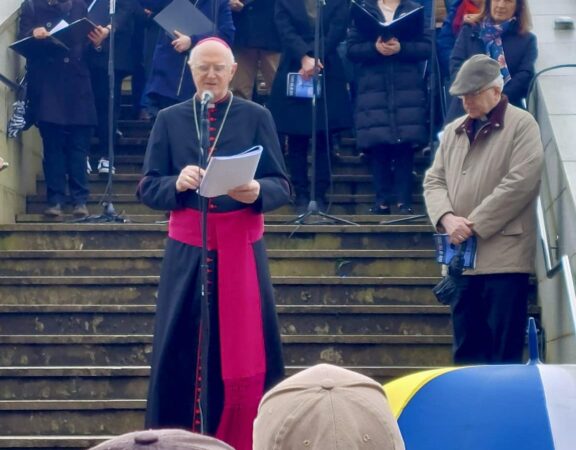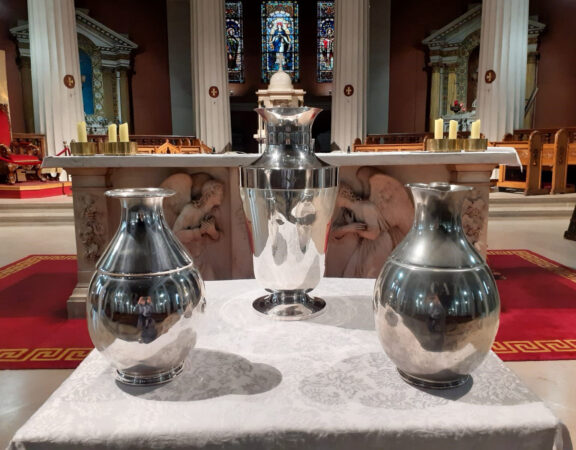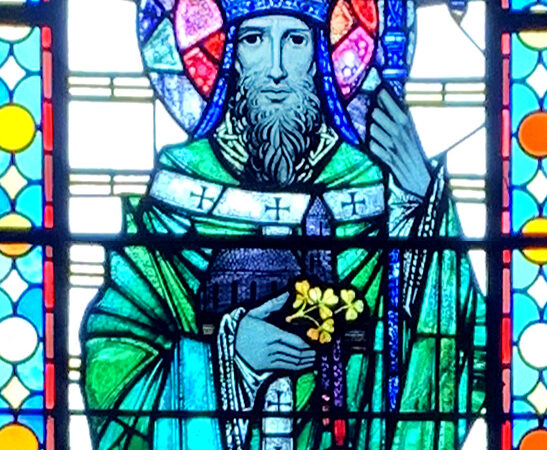MASS OF CHRISM
Homily notes of Most Rev. Diarmuid Martin, Archbishop of Dublin
St. Mary’s Pro-Cathedral, 10.00am Holy Thursday, 24th March 2016
Holy Week in the Year of Mercy! The celebration of the Jubilee Year of Mercy offers us a unique optic from which to attempt to understand more sensitively every aspect of our celebration of Holy Week.
Pope Francis entitled his recent book: “The name of God is mercy”. Being a Christian, means believing in a God whose name and whose very identity is mercy. Being a Christian means trying to fathom, even if through our own limited abilities, what believing in a God of mercy means for us as individuals and as a Christian community and indeed for the complex and at times harsh and violent world in which we live.
There is a phrase in the Gospel of St. John (Jn 13:1) which gives us a key to the understanding God’s mercy in its deepest meaning: “Having loved his own who were in the world, he loved them to the end”. God’s love knows no frontiers. The saving Passion of Jesus, which we celebrate in this Holy Week, is not a historical event of the past – but something active and which lasts and will be at work until the end of the world, until God’s kingdom of love is fully realised. God’s love for us knows no bounds; God’s mercy endures for ever.
Jesus came to us and took our flesh in order to lead us into the very life of God. In his self-giving and in his suffering he took on and continues to share the suffering of all humanity. His saving presence continues to touch the lives of each of us. The celebration of the mysteries of Holy Week revives within each of us the awareness that God’s loving embrace will never abandon us in all the ups and downs, the joys and the frustrations, the successes and failures, the goodness and the sinfulness of each of our lives.
This morning we come together as God’s people to bless and to consecrate oils for the service of the Church’s liturgy. Liturgy and life, however, belong together. The Oil of the Sick, the Oil of Catechumens and the Chrism are each in their own way symbols of how the mercy of God is mediated into our lives through the sacramental action of the Church. The human qualities of oil are transformed – as we will hear in the prayers – into signs and sacraments which restore our bodies, give a new endurance to our faith, and mirror the fragrance of God’s blessing.
The oils that we bless and consecrate represent the sacramental life of the Church and the many ways in which, through the action of Christ himself, God’s saving grace reaches out into the world of our time and brings comfort, healing and mercy.
The Preface of this morning’s Mass reminds us that the one royal priesthood of Jesus Christ continues in the Church through the one People of God. At this Mass of Chrism each year we bear witness in a special way to how the Church is composed of a people consecrated to God. We are gathered as representatives of every parish in the diocese and every dimension of the life of the Church: young and old, male and female, married and celibate, clerics and lay faithful, seminarians, deacons and priests, the auxiliary bishops; we all celebrate the Eucharist together with me as Archbishop.
I am really grateful to all of you for being here. There is a real sense of being here as a believing community. We can palpable sense a love of the Church. I thank you for being here and for what you do day after day in the service of the Church and I apologise for the ways I know where my own ministry has not been as supportive of you as it should. Please pray for me.
Each one of us shares the one baptism and shares in the one common priesthood of Jesus Christ in today’s world. Each of us comes with his or her own gifts and talents; each of us has his or her role and contribution to make within the Church. The Church of Jesus Christ is a Church which must welcome and respect and cares for the welfare of each of us. But what unites us is our common mission: we are all missionary disciples of Jesus Christ. We are all called to witness in our lives the joy which the Gospel of Jesus Christ brings to us and to accompany others in their lives so that they can share that same joy. No ministry or calling in the Church is an inward looking and self-centred one. Ministry is never just about me. We all belong to each other in the one body of Christ. We are all called to support one another in our mission of reaching out.
In today’s Mass we celebrate in a special way the calling of the ordained priesthood, remembering always however that we priests are called from among the people that God has made his own. We never leave that people. We are called to act in the name of Christ to serve God’s people. But we are also nourished within and by God’s people and through the faith of God’s people.
Our service as priests calls on us to nourish God’s people with the word and the sacraments, to renew Jesus’ sacrifice and to set before the people the paschal banquet, and to lead God’s holy people in charity.
You do not lead in charity from any position which would pose honour and prestige as its starting point. You lead in charity through living charity. The ministry of the priest is a ministry of love; it is a ministry which dispenses God’s mercy and not human estimations. It is not a mission to judge or to condemn, but to witness in love so as to allow God’s mercy embrace those whose hearts are broken or wounded or indeed whose hearts have hardened. To do that, we must first change our own hearts.
We all like what Pope Francis says and we like him even more when he says things we like. But Pope Francis also says things which challenge us and which challenge us to change our hearts. I was very struck by one thing he said at the conclusion of the Synod last October. He spoke of:
“Closed hearts which frequently hide even behind the Church’s teachings in order to judge others, sometimes with superiority and superficiality”.
Strong words: we can only bring the message of Jesus with hearts that are truly loving. As priests we must preach the message Jesus Christ in its integrity, but never our own judgementalism.
Pope Francis challenges all of us to go out beyond ourselves. He describes the work of the Spirit as “a powerful – and thus at times restless – breath”. The power of the spirit generates not conformity, but restlessness. The missionary disciple of Jesus is always restless to bring the Good News and the mercy of Jesus Christ to others.
Our Church in Ireland must become more restless in bringing the message of Jesus into our society. We priests became priests because in our youth we were fascinated by the person and the message of Jesus. That joyful and challenging experience changed our hearts. We have to become passionate again every new day, and restless in finding ways in which we can lead young people today to experience in their lives what the fascination with the message of Jesus meant to us in our youth.
With the passage of the years it is easy to lose that restlessness and for many reasons. We live in a Church and a society which has changed. It is not always a friendly society. We can feel isolated. I was very struck by the title that I was given for a talk to priests recently: “Living with a vocation you chose, but did not expect”. That is true about every calling in life.
Re-experiencing in our hearts the joy of the Gospel is what lifts up and renews hearts. We experience that joy through sharing, through working together – all of us clerics and lay persons – through supporting one another, through sharing in prayer, through the experience of reconciliation. Giving in to frustration is a refusal to recognise that the name of our God is mercy; a refusal to recognise that God’s mercy reaches out to us especially when we feel frustrated and feel like throwing in the towel. Mercy is an attribute of God. We see that right throughout the history of salvation. God treats his people with mercy and compassion even – especially – when they were unfaithful.
At the beginning of the first interview which Pope Francis gave shortly after his election, he was asked by the interviewer: “who exactly is Jorge Mario Bergoglio”. The Pope’s instant answer was: “I am a sinner”. Then he paused and said: “Let me reflect on that”. “No”, he said, “that is correct, I am a sinner”. In many ways this is one of the most fundamental insights we have into who this Pope is. One who considers himself in the first place a sinner cannot be arrogant and harsh in his judgement of other sinners. This is a message for us all.
Holy Week in the Year of Mercy! We live in a world which is often harsh and violent. We have witnessed horrific, hate-filled violence and retaliation on our streets again last night; when will these people learn that violence and revenge only lead to further violence and revenge? They feel that violence is their strength; yet violence will be their downfall. Will they ever learn?
Jesus rejected violence; he submitted himself to violence and injustice. He came to bring good news not hatred, he came not destroy hearts but to bind-up hearts that were wounded. We now come to bless and consecrate these Holy Oils and commit ourselves, our parishes, our families to recognise our sinfulness and allow the powerful mercy of our God to transform us, to heal us and to work through us to bring a new heart to our lives, to our society and to our Church. ENDS









